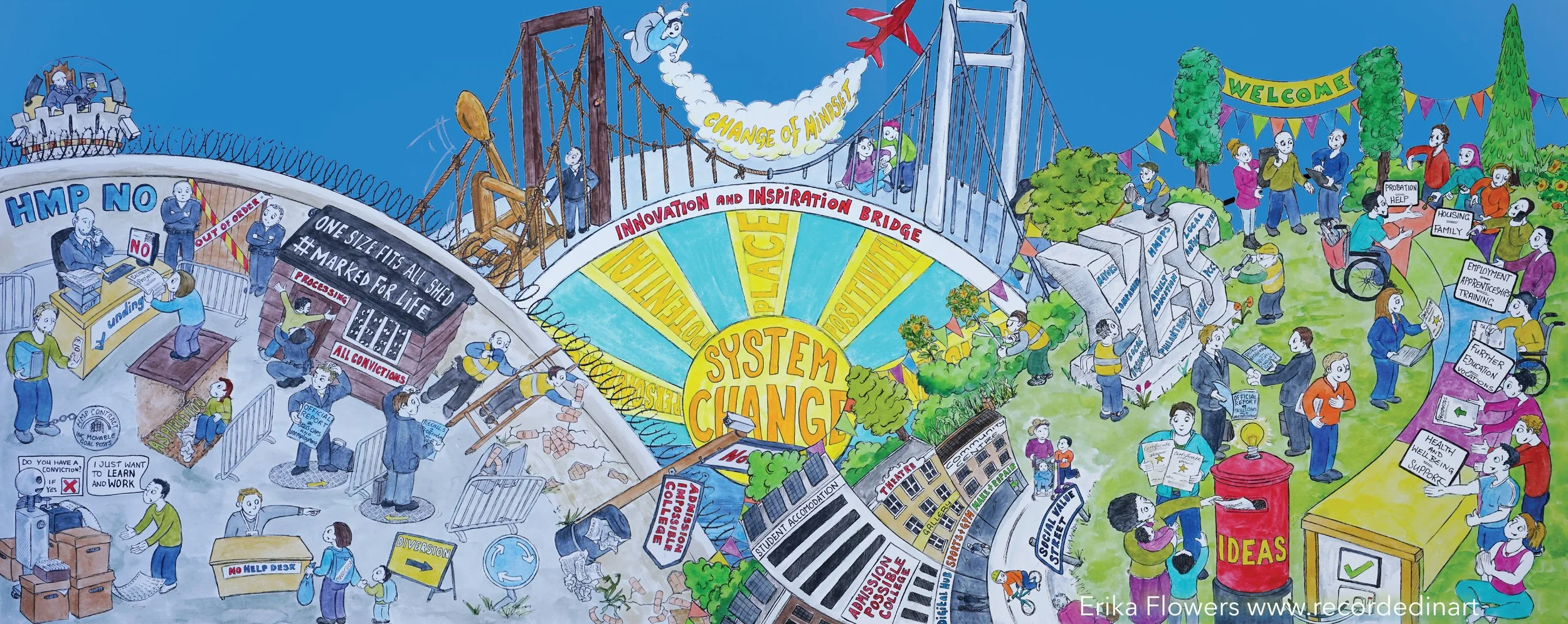Transforming Further Education in the Justice System: Imagining a New Future
This partnership project with UCL’s Centre for Education and Criminal Justice highlighted the power of the methods and approaches that Justice Futures is promoting. The project brought together practitioners, policymakers, educators, and people with lived experience to explore how FE colleges can better support people leaving prison or on probation into meaningful education, training, and careers — particularly in the arts, sports, and digital industries. These are areas full of potential but often overlooked in justice education and employment pathways.
At the moment education and training in prison and probation remains fragmented, underfunded, and unequal. Opportunities for progression are scarce, especially for those seeking to develop skills beyond traditional trades. Many face compounded barriers linked to race, gender, neurodivergence, disability, or the stigma of a criminal record. FE colleges, with their national reach and inclusive ethos, could be a vital bridge and yet they currently play only a minimal role in justice education. This project set out to imagine what could change if they were placed at the centre.
Creative futures thinking
The project team worked with over seventy participants across workshops, interviews, and surveys. We used Bill Sharpe’s (2020) Three Horizons framework, participants explored:
Horizon One – The present system: Described as fragmented, rigid, and disconnected.
Horizon Two – Signs of innovation: Local partnerships and creative pilots offering glimpses of change.
Horizon Three – A transformative future: A collaborative, people-centred system built on trust, flexibility, and inclusion.
Creative methodologies such as rich picturing and photovoice enabled participants to visualise challenges and co-create alternative futures. These approaches gave equal voice to lived experience and professional expertise, ensuring diverse perspectives shaped the vision.
The key takeaways
The research identified five foundations for meaningful transformation:
A mindset shift from “can’t do” to “can-do” cultures in FE and justice.
Personalised learning pathways that meet individual needs and aspirations.
Strong partnerships between FE, justice agencies, employers, charities, and people with lived experience.
Sustainable funding and structural reform to support long-term impact.
Leadership by lived experience, ensuring those most affected shape the solutions.
Participants imagined a justice system where every prison is connected to its local FE college; where contracts and funding are flexible and co-produced; and where arts, sports, and digital careers are recognised as legitimate, valued pathways. As one participant reflected, “The amount of creativity, energy and initiative there is to improve the system - if only the system would allow it.”
If this occurred participants envisaged a future where:
Every prison is connected to its local FE college.
Contracts and funding are flexible, sustainable, and co-produced.
Vetting and admissions processes are fair, transparent, and context sensitive.
Arts, sports, and digital industries are valued as serious career pathways.
People leaving prison or on probation have holistic, personalised support, enabling them to thrive in education and employment.
The project calls for the creation of a national working group bringing together the Ministry of Justice, HM Prisons and Probation Service, the Department for Education, employers, FE leaders, charities, and people with lived experience. Its purpose: to turn this shared vision into action and build lasting partnerships between FE and justice.
We believe that this project shows what’s possible when lived experience, creativity, and collaboration come together. FE colleges can be a powerful bridge to opportunity that help people not just move on from prison but move forward.
To discuss the report findings we held an online event. We were really pleased to hear from a number of stakeholders who participated in the project notably Kieron Bryan (our Justice Futures’ Associate); Erika Flowers (artist who created the map/image for the project); Carlotta Allum (CEO Stretch); Jazz Singh (CEO EmpowerAbility); Eddie Playfair (Association of Colleges); Lindsey Middleton (CEO 180 Project) and Reshma Malhotra (HM Prisons and Probation Service(. The energy at the event was hopeful but mindful of both the challenges ahead and the collective will to tackle them.
Read the full report, and watch the event:

